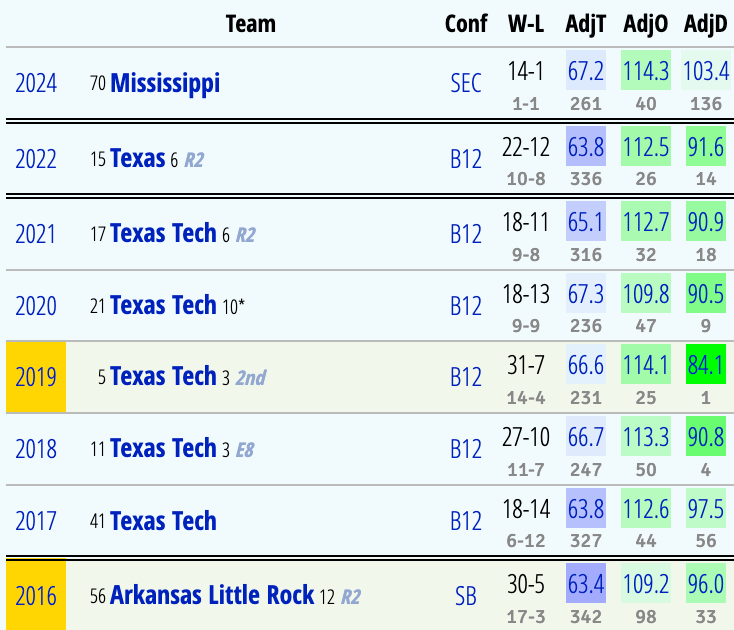Who's been hurt by the lack of charges
The new rule has been great for the game, but bad for some coaches
After three days of the season, we wrote about how the new charge rule was affecting the game. You can do a lot with early-season data and the benefits of the increased standard for a secondary defender taking a charge were clear. The signs were there that the product of college basketball was headed for its best season ever.
There’s a segment of college hoops fandom that was skeptical whether this would last. That somehow officials would start using last season’s rulebook at some point. But that hasn’t happened. As they do every season, offensive fouls per game have decreased since the first three days of the season. Almost at an identical rate as they did in the past two seasons.
And as it was back in November, offensive rating is still tracking for one of the highest figures we’ve ever seen. In fact, it’s been steadily gaining ground on the record season of 2014, now trailing by just 0.1 point per 100 possessions at the same point in the season. After three days of the season, it trailed by 0.8 points per 100 possessions.
While the game is clearly better for the rule change, some coaches appear to have had trouble adapting. I’m going to use non-steal turnover percentage (NST%) for this analysis as it’s a good enough proxy for charges taken. To find out which coaches have been affected the most by the rule change, I compared their average NST% over the last five seasons to their NST % this season. Here’s the top five differences:
In the interest of additional self-congratulatory content, I nailed that Beard would be the most impacted the rule back in June. Per play-by-play data, Mississippi has drawn a total of 5 offensive fouls so far this season. For reference, Texas drew a total of 168 offensive fouls over the last two seasons. As a result, the charge-master has seen his ability to deploy an elite defense instantly vanish.
The change in employers complicates the root-cause analysis1 but with a defense ranked 136th, Beard is on pace to coach the worst defense of his college coaching career by far.
The other big name on the list is Buzz Williams whose Texas A&M team has been widely viewed as a disappointment after being picked 2nd in the SEC preseason media poll. Some of the inflated preseason ranking was due to people focusing on A&M’s 17-4 record against SEC teams and ignoring all other games last season, many of which were not indicative of a team that was one of the best in the SEC.
But also, we might have anticipated that Buzz’s team would have some trouble adjusting to the charge rule. The Aggies’ adjusted defensive efficiency is 2.2 points per 100 possessions higher than Buzz’s average over the previous five seasons.
The question is how much of this change can be attributed to the lack of charges. I’m not going dive into film and try to figure this out. But we can get a quick estimate. Here’s each qualifying coaches difference in NST% (from this season to their five-year average) plotted against the difference in AdjDE, along with the best fit line for the data.
For each 1% decrease in NST rate, we get an average increase of 0.5 points in AdjDE. So Chris Beard’s decrease of 5.9% in NST rate would be expected to yield a 3.0 point increase in AdjDE. And for Buzz Williams, we’d expect an increase of 2.4 points. They’ve seen their actual defensive rating increase by 12.8 and 2.2, respectively, so the rules change doesn’t explain everything in Beard’s case.
Still, it seems to have been an actual factor for both of these coaches. It’s worth mentioning that the fifth-most affected coach, Chris Jans, has had no trouble adjusting to the rules. Mississippi State’s defense currently ranks tenth in the country and has been consistently good from the beginning of the season, even without many offensive fouls to end possessions.
Then there are cases like T.J. Otzelberger whose defense depended on offensive fouls last season (2.8 per game), and is still getting enough of them (1.7 per game) this season to continue to facilitate a dominant defense. So one doesn’t even have to abandon their defensive identity in this new world.
We know that coach of the year voting has nothing to do with actual coaching. It’s basically awarded to the coach of the AP top ten(-ish) team that surpassed expectations the most. But if it was about coaching, you’d have to consider Jans and Otzelberger given that they’ve done something that other top coaches have been unable to do.
The charge rule has made the game much more fun, but it’s presented challenges to coaches who depended on offensive fouls in the past. Some have been able to adapt and others have struggled. The trajectory of the season for Mississippi and Texas A&M will largely depend on whether their coaching staffs can figure out how to play defense in a game where charges are much more difficult to get.
Special thanks to ESPN’s Tom Hart for the topic suggestion.
The Rebels currently have Jamarion Sharp, the best shot blocker in the nation, starting at center and he wasn’t in the business of taking charges even when officials were willing to call them.





